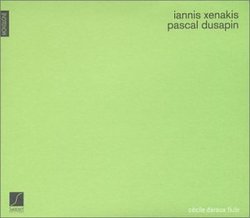| All Artists: Pascal Dusapin, Iannis Xenakis, Cecile Daroux Title: Iannis Xenakis, Pascal Dusapin Members Wishing: 2 Total Copies: 0 Label: Disques Montaigne Release Date: 3/16/2004 Genres: Pop, Classical Styles: Vocal Pop, Chamber Music, Historical Periods, Classical (c.1770-1830) Number of Discs: 1 SwapaCD Credits: 1 UPC: 822186821732 |
Search - Pascal Dusapin, Iannis Xenakis, Cecile Daroux :: Iannis Xenakis, Pascal Dusapin
 | Pascal Dusapin, Iannis Xenakis, Cecile Daroux Iannis Xenakis, Pascal Dusapin Genres: Pop, Classical
|
Larger Image |
CD Details |
CD ReviewsBeautiful focused/focusing contemporary flute works/explorat greg taylor | Portland, Oregon United States | 10/31/2005 (5 out of 5 stars) "The Montainge label has lately become one of my favorites for their championing of the contemporary classical European repretoire. The performers are consistently excellent and the production values are reliably high. The featured performer on this CD is Cecile Daroux on piccolo and various flutes.
She performs pieces by Iannis Xenakis and Pascal Dusapin. Both of these composers have studied non-Western musics and these pieces demonstrate that. Furthermore, Daroux has approached her flute as one of the instruments that is common to all cultures and has obviously tried to adapt some of the technical resources of non-Western flutes (the shakuhachi, the ney) to her instrument. The first piece, Xenakis' "nyuyo" is a case in point. Originally written for shakuhachi, two kotos and a sangen, it has been adapted for flute and three guitars. The guitarists use plucking techniques derived from the japanese instruments and Daroux works her embrouchure and breathing to adapt her flute to some of the techniques of the shakuhachi tradition. I am not claiming that the results sound like any of the traditional styles of shaku playing (and would not be qualified to make that claim). What I am claiming is that Xenakis and Daroux have managed to create a music that has a similar centering effect on the listener by drawing on resources from both the shaku and the western tradition. Which brings me to a point about this CD. Some types of music require a fair amount of concentration in order to enjoy. At some point with this CD, I suspect you will have to give it a good focused listening to hear what Daroux and her composers are doing. Consider Dusapin's "laps" performed by Daroux with Jean-Paul Celea on the contrabass. Celea's performance is essential to this work. He brings one of the softest bowing techniques I have ever heard. The result is an arco tone that is a whisper, that has a breathiness that mingles with that of the flute until(as the liner notes suggest) individual identity disappears. This is music that is more about the history of the sound of the instruments than it is about a melodic arc. I like this piece very much. The other pieces are two solo pieces, a duet with a soprano, a duet with percussion and a trio with soprano and piano. In spite of the relatively limited instrumental palette, the music always retains my interest. I attribute this not only to the fact that Xenakis and Dusapin are endlessly interesting composers but also to Daroux. It is hard not to respond to someone who looks at their instrument as an expression of an universal human urge. She obviously sees all musics as belonging to the tradition of her instrument and studies in order to be able to manifest that universality. In so doing, she has won me over completely. I will be buying other CDs by her (and, of course, others featuring the works of Dusapin and Xenakis). If you feel any love for the flute at all, this CD should be part of your collection." |

 Track Listings (7) - Disc #1
Track Listings (7) - Disc #1